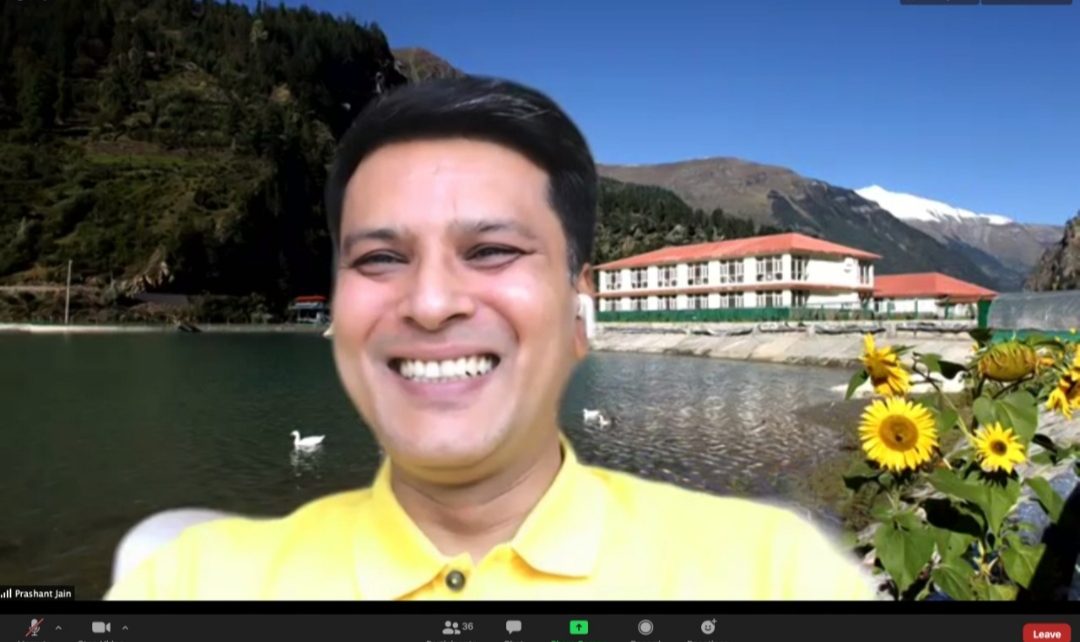Ranchi, Jharkhand | May | 27, 2020.:: TEDxKanke organized a TEDxKanke: Webinar, with the topic Power sector : A key driver of future development
The Speaker of the Webinar was Prashant Jain, Joint MD & CEO, JSW Energy Ltd..and moderated By Rajeev Gupta, Curator, TEDxKanke
On the future of Power sector and role of JSW Energy, Prashant said
• The consumption in India is close to 1300 billion units (BU). The power consumption per capita is around 1000 units which is significantly less to that in the developed world (~6000 units per capita). Thus, we have a long road ahead to catch up on the power consumption as seen in developed countries.
• We have a major technology shift in that the world is moving from thermal power to renewable power. Given a capacity factor of about 30% for renewables, India would require setting up 3 TW capacity in next 20-25 years to achieve 1 TW production from the renewables.
• Power demand has been growing at the same rate as GDP in the past 20 years. Though this has changed over time as power efficiency has improved and will continue to improve with technology advancements in appliances and utility systems.
• If our GDP grows by even 5%, we are expecting the power demand to grow by 3.5%-4% over a period of next 20 years. This requires installation of about 30 GW of new renewables for the next 20 years. With the current capital cost of INR 5,000 crores per GW, we are looking at a requirement of INR 150,000 crores ($200 Billion) per year in this sector.
• Power sector has been marred with problems and crises, both locally and globally. The sector requires powerful reforms such as new tariff policies, direct subsidies to consumers and digital interventions for investments to flow. Fortunately, we do have a framework in place to make this possible.
• The role of JSW becomes vital here as it is one of the only few companies with strong fundamentals and generate good cash flows. JSW targets to become a 10 GW company in next 5 years and 20 GW in next 10.
On future of renewable energy He said
• Renewables are optically very cheap compared to coal-based power. The transmission and distribution cost are absorbed by all-over India pooling basis and the inter-state transmission costs are free.
• Approx. thermal power is 3.6 INR. Transmission corridor is built for 24-hour construct. In renewables the capacity utilization factor is about 30% as it depends on weather conditions. Hence transmission costs will go up and the life to life costs will be similar as thermal power. However, with technological advance-ments it can be said that renewables are the only option going forward.
• Demand management will become important to handle the intermittent supply of power through renewables while existing coal capacity will function as the base load requirements. Eventually, the annual increment in power demand has to be fulfilled completely through renewable energy.
• Govt policies have moved from cost plus regime to enhancing competitive bidding processes. The regulations ensure a fixed unit price with no increment on PPA (power purchase agreement). Further, digital metering for power supply is being implemented which will help in better management and in reducing the cost of power to consumers.
Audience Questions:
What is the future of our coal resources? Govt. has come up with commercial mining policies for coal. What impact will this have on extraction of coal resources?
By Mr Sunil Barnwal, IAS, Govt. of Jharkhand
• The privatization of coal has come pretty late. The kind of resources we have does not resonate with the amount of coal we are mining at the moment. Only 750 Million tones mines in India as compared to 4.5 Billion tons of coal mined in China annually. India can consume coal for its industrial requirements.
• The coal is highly taxed sector – Carbon Tax, GST, Royalty, Premiums etc. This makes Indian coal less viable, which already has a high ash content.
• For private sector, land acquisition and evacuation are big challenges. The execution of commercial mining requires permit under Coal Bearing Act. Environmental and Forest Clearance has to be considered as well. Simultaneously, synergy from Railways for infrastructural support is also necessary.
• This is a huge opportunity for State Governments where coal mining will become a great cash cow.
The current crisis has broken down major supply-chain structures. What impact will this have on renewable energy projects and on decarbonization of our society?
By Mr Sushant Bharti, Facebook audience
• Current scenarios have definitely affected the ongoing projects with delays in development and stalling of major renewable project.
• The impact should be temporary, for a period of 6-12 months and thereafter the thigs should start to restore. Supply-chains should become normal in the next 3-9 months and most projects should be back on track.
Journey of Prashant Jain at JSW
“My journey has been pretty simple. An engineer by qualification, I started my career with DCM Shri Ram Industries in 1992. I worked in a sugar mill for three years close to my native place – Meerut, though this sector was not the right opportunity for me. I remember going through the Classified pages every Wednesday to find an opportunity that would be a better fit for me. This is how I started as an Assistant manager at JSW. Operating and managing the plant and growing through the managerial ladder, I was pursuing my dreams. In 2003, I was called up by Mr Jindal where he offered me a corporate role in Vijaynagar. Initially, I denied the opportunity doubting my role at in a corporate office. But later I took upon the challenge of doing something novel and started handing the commercial functions. My learning through these experiences have been that the best opportunities arise from the challenges that we are not willing to take.”



